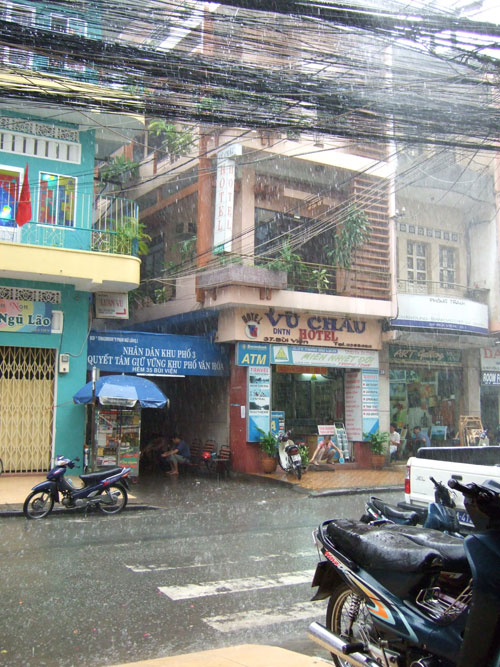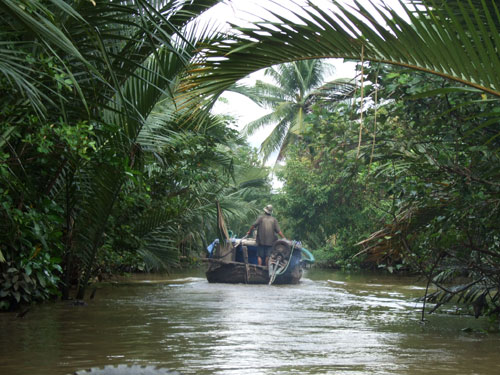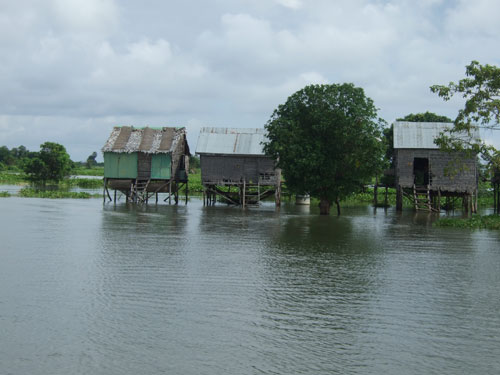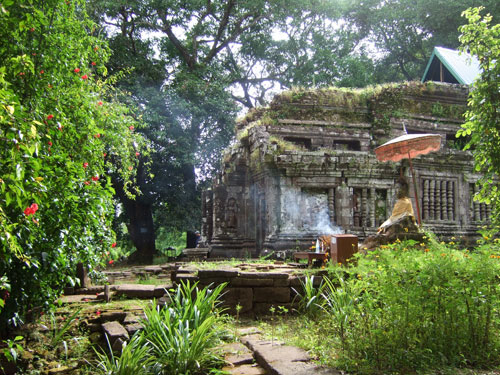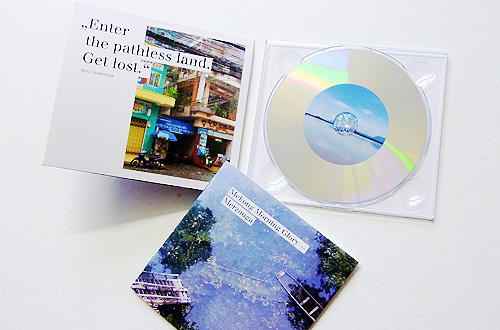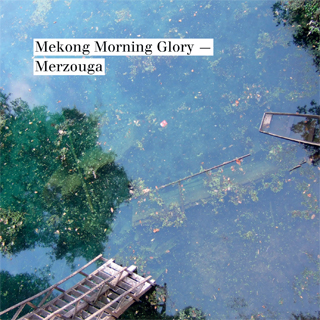
Mekong Morning Glory | Merzouga
Gruen 092 | Audio CD > [order]
MP3 & FLAC > [order]
1. Excerpt Laos 1
2. Excerpt Laos 2
3. Excerpt Cambodia
4. Excerpt Vietnam
1 Track (49′02″)
CD (500 copies)
The Mekong River is one of the world’s major rivers. On its more than 4.000 km long way from its source in the Tibetan Plateau to the Delta in South Vietnam it passes an altitude difference of 5.000 km, travels through seven countries, three climatic zones and three different culture areas.
On an extensive journey Eva and I followed the lower course of the Mekong River and travelled downstream through Laos, Cambodia and Vietnam. On its way the Mae Nam Khong, the „Mother River of All Things“, creates all life around it. It determines the flora and fauna, floods rice-fields and synchronizes the life of people. Everywhere along its banks buzzing, fertile, tropical life shoots up. We set off with our microphone to collect the sounds that this bustling activity of life creates.
A significant compositional approach is the metamorphosis and the merging of sounds. We examine field-recordings in regard to their musical qualities („Music in the sense of meaningful sound-patterns“- Bill Fontana) and fuse them with electronically processed electric bass sounds. The piece’s compositional arc is inspired by the lower course of the river that flows in a gigantic crescendo-movement towards the sea. As a poetic musical analogy to the dark jungle river we use my prepared bass guitar, this long-waved instrument that generates all the musical sounds in the composition. Using Chinese chopsticks, golf balls, knitting needles and wine corks I have been systematically altering and expanding the sound spectrum of my instrument for the past decade.
We embark upon an acoustic journey that begins on the banks of the Mekong but reaches far beyond them. Just like the traveler entering the tropical foreignness, the listener enters an acoustic place that quickly condenses into an unreal world of metamorphosis. (Janko Hanushevsky)
Merzouga: Eva Pöpplein & Janko Hanushevsky
Field-Recordings taken by Merzouga in Laos, Cambodia and Vietnam, autumn 2008.
Composed by Merzouga in Cologne/Germany, summer 2009.
Mixed and mastered by Eva Pöpplein in Cologne/Germany, autumn 2009.
Commissioned and produced by Deutschlandradio Kultur/Klangkunst.
Commissioning editor: Marcus Gammel. Premiere broadcast on November 6, 2009.
Design by Sebastian Ristow, FLATLAB. Photos by Merzouga. Artists portrait by Jörg Küster.
Merzouga would like to thank: Roland Etzin, Lasse-Marc Riek, Marcus Gammel, Deutschlandradio Kultur and SKE-Fonds.
Special Thanks to: Andres Bosshard for the liner notes, Sonja Harth for being Merzouga’s third ear, Peter Herbert for his friendship and his continuous inspiration, our families for their love and support and last but not least our worldwide network of friends.
Dedicated to Mira.
www.merzougamusic.com
With kind support of SKE-Fonds
Soundscape Series by Gruenrekorder
Germany / 2011 / Gruen 092 / LC 09488 / GEMA / EAN: 4050486048443
Russell Cuzner | Musique Machine
Increasingly musicians are incorporating field recordings into their compositions, where the more traditional, instrument-based rules can be eschewed in favour of exploring the musical properties of the world’s rich, natural timbres and irregular rhythms. So it’s interesting to find artists coming from the opposite direction to this trend.
Eva Pöpplein and Janko Hanushevsky primarily produce plays and documentaries together for German radio, but on Mekong Morning Glory they took a range of field recordings from their travels down the Mekong River, selected mainly for their musical properties, and placed them conveniently along a path laid by Hanushevsky’s prepared electric bass guitar. Far from being a contrived travel’n’bass jam, the resultant 49 minute piece is a comfortable, immersive soundtrack through rural to urban soundscapes.
The first five minutes surprise by how musical it all sounds -twinkling bells sparkle under groaning bass arcs with only the odd bird call indicating a real world environment. But, like an orchestra having tuned-up, the piece then falls silent to introduce the first watery sounds of the river as they’re gradually joined by wind chimes, children’s voices and echoing droplets from a cave. Its suspenseful whirrs and clicks attract increasing amounts of insect and animal life as the eerie, reverent atmosphere is joined by a subtle bass drone undertow. Later, call-and-response motifs on what sounds like ethnic stringed instruments are emboldened by more long, moody, intoning bass as water, wind and rain seek and eventually succeed to erode its passage.
The spare and measured plucks punctuate throughout where it is sometimes difficult to discern which elements are from the field as opposed to the studio. Hanushevsky’s bass only occasionally takes the foreground; more often it is subtly deployed to offer a few stepping stones, which cannot always be relied upon as the dominant roar of the life-giving and life-taking river, or the bustling urban chatter of Vietnam, becomes all consuming at times.
And it is this balance between the listener’s cerebral and visceralexperience of the sounds, whatever their source, that Merzouga cleverly strike. Mekong Morning Glory rarely feels like a documentary, but more a truly experimental composition equally concerned with tone, timbre and texture, to create a new place for its listeners to visit instead of merely capturing an existing one.
Aurelio Cianciotta | Neural
The Mekong river is among the longest in Asia. It starts in Tibet and runs through Thailand, China’s Yunnan province, Burma, Laos, Vietnam and finally Cambodia. Both in Lao and Thai languages the name Maè Nam Khong refers etymologically to the ancestral „mother“, the origin of every feeling and thing. Eva Pöpplein and Janko Hanushevsky undertook an adventurous pilgrimage along the river, developing field recordings before reworking the sounds in post-production. Janko Hanushevsky added many parts on an unconventionally played electric bass, making use of drumsticks, golf balls, knitting needles and bottle tops. When listening, what really matters here is the changeable passage of the sounds, the metamorphosis of the environments, the way intense suggestions are raised: according to this approach the structured parts, field-recordings and added materials are treated in the same way, as raw contributions to be combined into a new form. We find ourselves enveloped in dark drones, tangential post-blues, auditive emergencies, jingles, bleeps, thuds and muffled reverberations. The imaginative „journey“ is very redolent of „Heart of Darkness“ by Joseph Conrad, the inspirational text behind „Apocalypse Now“ – a narration crowded with environmental resonances, voices and elegiac winces.
Stephen Fruitman | Avant Music News
The Mekong is one of the world´s mighty rivers, 4,000 km long, descending more than five thousand meters as it passes through seven Southeast Asian countries. Unfortunately, it has been historically burdened with memories of an ugly war. “Mekong Morning Glory” is a heart of lightness to counterbalance the dark impression left in equal measure by that war and by Francis Ford Coppola´s “Apocalypse Now”. German husband and wife soundscapers Janko Hanushevsky and Eva Pöpplein travelled through Laos, Cambodia and Vietnam, waving a microphone in the air to capture sound from the river and its banks. All the “musical sounds” (his words) on the record come from Hanushevsky´s prepared bass guitar (prepared with golf balls, chop sticks, wine corks) and the long journey has been edited down to an eventful forty-nine minutes with computer software.
As sound art, it is executed in a manner similar to another husband-and-wife duo, ambient artists Celer, whose catalogue bulges with hybrid field recordings. But Merzouga are far more literal as documentarians on the one hand, and far more adventurous – mostly to their advantage – as improvising musicians. As they float down the river, temple bells ring, kids play, wood is chopped, motors putter, birds twitter and rain patters. Often letting their source material speak for itself, at other times they treat it with heavy reverb, flicks of backward-running tape, and grainy loops that whip up a full-blown monsoon halfway through. It gets similarly raucous when they pass through a coastal town, until drifting beyond the delta to the tune of wind chimes and mingling with the sea.
Denis Boyer | FEARDROP
Loin de nous d’abord, le fleuve Mekong, tel que l’ont réinventé Eva Pöpplein et Janko Hanushevsky du duo allemand Merzouga. L’album Mekong Morning Glory4 est, selon les propres termes des musiciens, une métamor- phose, celle des sons des lieux traversés, et celle d’un instrument de prédilection, la basse. L’un comme l’autre matériau sont tels « une argile », que les musiciens ont modelée. Il est donc tout à fait hors de question de rappor- ter des fragments du fleuve, des instantanés, mais bien de refaire le paysage en l’interpré- tant. L’accord de l’instrument et des field re- cordings est pensé comme celui des couleurs, certains se répondent, d’autres s’opposent et se mettent en relief, d’autres encore se mé- langent. Une scénographie nouvelle naît du flot alterné des tremblements, des prises de sons métalliques et des évocations aqueuses, une dramaturgie même, née de la tension des pauses, comme si le rythme du fleuve s’impo- sait en réserve au butin réagencé des bruits qu’il a offerts et appelés. La basse, de note en note, de loin en loin, met le rythme de la descente du fleuve en mémoire. Non la crainte que l’évocation d’Au cœur des ténèbres de Conrad pourrait éveiller (il est même cité dans les notes de livret), mais une inquiétude par- fois, lorsque les strates de pluie s’imposent au premier plan, telles un focus sur le gris que le tableau serre entre deux rubans de ciel bleu. C’est une texture malléable, absolument fluide que les deux musiciens allemands ont mise au point et, si leur approche est tout à fait celle de la musique concrète romantisée, pour l’esprit elle appelle aussi en comparaison le paysa- gisme de Paul Schütze. Les nimbes d’harmo- niques qui s’élèvent au-dessus du fleuve, la basse qui s’y insinue, les oiseaux dont la dense conversation cliquante parfois la surplombe, peignent indéniablement le paysage musical, son souffle, son rythme, son germe de fredon- nement, sa fragile lumière en parfait équilibre. 4 Sur le label Gruenrekorder, 2011
Joshua Meggitt | Cyclic Defrost
Mekong Morning Glory takes Francisco Lopez’s full-spectrum approach to field recording, editing sounds to extract their maximum sonic impact, while adding further processing and instrumental adornments to create a kind of personal audio postcard. Merzouga’s Eva Pöpplein & Janko Hanushevsky traveled through Laos, Cambodia and Vietnam on the Mekong capturing sounds which were then tinkered with. “We examine field-recordings in regard to their musical qualities … and fuse them with electronically processed electric bass sounds.” Hanushevsky also adds chopsticks, golf balls, knitting needles and wine corks to his bass playing. Don’t go in expecting a crisp snapshot of the river – insects, water, voices and the like – as I did, but submit to the ‘ambiance’ of the locale via Merzouga’s re-creation of that space and you’ll be pleasantly surprised.
The bass is most noticeable through the central section of the 49-minute piece creating a kind of musical saw-type effect. It enters, after opening patterns of wind chimes and a dull grey drone, as a Ry Cooder-esque slide guitar, its gurgling tone merging with the splash of the river. Elswhere its perhaps responsible for various prepared piano- type tinkerings and digital blips and blops.
Their editing however is what most impresses, particularly a violent segment late in the piece involving cascades of white noise: waterfalls, rapids, raining shells and granular synthesis collapsing and colliding in a symphony of tiny detail. From here they introduce a sinuous drone using what sounds like Akira Rabelais’s Argeiophontes Lyre software, before ending in unprocessed chatter, traffic and motorcycle throttle.
MR | Paris Transatlantic Magazine
Those who think „Morning Glory“ is the third course of „Alan’s Psychedelic Breakfast“ on Atom Heart Mother might like to know that’s it’s also a tropical vegetable (aka water spinach) native to South East Asia, which influenced Eva Pöpplein and Janko Hanushevsky (aka Merzouga) as they sailed down the Mekong river across Laos, Cambodia and Vietnam in 2008. As for the musical outcome, the voyage represents an interesting stab at combining field recordings and processed instruments, with a prepared bass guitar the lone extra-environmental source. The gradual increase in sonic concentration maps the transition from unspoiled nature to downtown bedlam, as sinuous oneiric washes delineate a virgin landscape progressively morphing into the typical traffic-burdened accents of a messy borough in the midst of its daily activity, with a number of scenes underscored by customized low frequencies. Throughout the journey we’re greeted by noisy animals and humans, with children mixed well up front, while the river itself remains relatively quiet, apart from the roar of the waterfalls at the Cambodian border. It all sounds much better than an average day at the office.–MR
PvdG | PROGRESS REPORT
Enter the pathless land. Get lost……. With this message in mind a journey along one of the world’s major rivers, the Mekong, starts. Two adventurous minds from Germany, Eva Pöpplein and Janko Hanushevsky travelled the river downstream back in 2008. A warning comes along with the extensive liner notes; this is not a documentary. And thank god it isn’t. What is offered on the disk is a beautifully processed field recording, in which nature’s very diverse and intense sounds are treated and blended with instruments, electronics and bass guitar. The piece starts calmly and sinisterly, mixing recordings from nature with added electronic sounds, but nowhere does the river become a threat, only when approximately halfway (I believe we are nearing Cambodia then) a giant outburst of white noise occurs, an ear deafening experience as if all is washed away within the waterfalls. From then onwards, things become more relaxing, fluid almost. Slowly evolving drones mixed with sounds from the riverbanks, birds singing, children shouting, all give it an earthy and unearthly feel at the same time. This part reminded me somehow of the great Heinekens Jamaica trip by Charlemagne Palestine, an overwhelming feeling of calm and ease, creating the feeling that the exhausting journey is coming to an end.
Can you document as many as possible impressions from a landscape that stretches over nearly 4400 kilometers and some 7 different countries? I guess this is the wrong question to ask, meaning that this probably isn’t what was aimed for at all. The impressive 49 minute-piece is however able to capture both the beauty, the calmness and the greatness and also how the river sometimes shows its unforgiving character followed by moments of perfect stillness, with further beauty waiting to become unveiled, but stripped in its essence the grand finale turns out to be nothing more than a desire to finally drain into the south Chinese sea, leaving countless impressions for those who want to hear. An epic work of art.
Eric Lanzillotta | BIXOBAL
the duo of Eva Pöpplein and Janko Hanushevsky traveled through Laos, Cambodia and Vietnam along the mighty Mekong River in autumn 2008. however, despite being in Gruenrekorder’s Soundscape Series, this is not a collection of straight field recordings. the river jungle sounds are re-edited, put through various effects and combined with other sound sources. the first addition is prepared bass guitar which does make for some nice experimental textures, but after this introduction the disc heads more in an ambient direction using solemn synth sounds with an increase in echo added to the voices of the Mekong. it is this ambient atmosphere which seems to be the most dominant in the disc’s 49 minutes. packaged in a Digipak with a 12 page booklet, there are some nice photos of the region along with recollections of the compositional processing. as they state, this disc is not meant to be a documentary and as such has a very European finish to it, in contrast to say the more raw sounds we have come to expect from Sublime Frequencies.
Zipo | aufabwegen
Das Duo Merzouga (Eva Pöpplein & Janko Hanushevsky) ist den Spuren des Mekong gefolgt. Mekong Morning Glory intendiert dabei nicht in Nachfolge zu Annea Lockwood eine “Sound Map” des Flusses zu zeichnen, sondern der mächtige Strom fungiert als Inspirator und roter Erzählfaden für eine akustische Geschichte. Das Zitat aus Joseph Conrads großartiger Erzählung “Herz der Finsternis”, in der auch ein Fluß eine wichtige Rolle spielt, scheint diese These zu unterstreichen. Es geht eben nicht um Dokumentation, sondern um eine Fiktion, die durch dokumentarische Elemente an Dichte gewinnt. Wenn also prasselnder tropischer Regen, spielende Kinder oder rauschendes Wasser zu hören sind, dann als Elemente einer Komposition, die den Charakter eines Reisetagebuchs trägt. Erlebtes wird verarbeitet, reflektiert, in der Erinnerung verfremdet und neu zusammengestzt. Auch rein abstrakt-elektronische Sounds kommen hier vor, wie die Stützen der Erinnerung, wie die akustischen Black Outs auf einer Reise in eine fremde Welt. Hin und Zurück.
Guillermo Escudero | Loop
This album belongs to the German label Gruenrekorder’s Soundscape Series we have reviewed before as with the Digital Series. Eva Pöpplein (computer) and Janko Hanushevsky (bass) from Germany have been working together since 2002 in music improvisation and composing music for radio, theater and film. Both in 2009 did a trip down the Mekong River through Laos, Cambodia and Vietnam in the Autumn of 2008 where they made field recordings of sounds of that subtropical place, its flora and fauna and the day to day life of the people living there. The recorded sounds were fused and processed electronically with a prepared electric bass that emits a long wave flickering sound generating all the musical sounds of the composition. There are passages in this album of 48 minutes in duration that are certainly disturbing and dark. I figured out an inhospitable nature but as I hear the voices of the people, horns and engines of motorcycles like, I recognize a world’s best known and urban areas. No doubt the music and recordings could carry me to these distant lands.
Ron Schepper | textura
Part of Gruenrekorder’s Soundscape Series, Merzouga’s Mekong Morning Glory presents a forty-nine-minute, single-track travelogue by computer musician Eva Pöpplein and electric bassist Janko Hanushevsky. Originating out of the Tibetan Plateau, the Mekong River travels through seven countries (including Laos and Cambodia) and influences all manner of flora and fauna before ending up in South Vietnam. For this project, Merzouga followed the river during the fall of 2008 and recorded as they did so its wealth of life-forms so as to subsequently incorporate the material into a large-form composition. Operating together as Merzouga since 2002, Pöpplein and Hanushevsky bring an inspired concept to the electro-acoustic soundscaping genre in merging prepared bass guitar playing, field recordings, live electronics, and computer manipulations into a provocative hybrid.
Emerging quietly out of a cavernous realm of bell tinklings and bass guitar shadings, Mekong Morning Glory exudes a spectral character in its early going (the journey begins in Laos) before the chatter of children’s voices humanizes it. At the ten-minute mark, natural sounds wholly dominate, and we feel as if we’re moving through a seldom-visited part of the river landscape, one that’s nonetheless abundant in non-human life forms. From then on, successive episodes of contrasting character appear; a foreboding one finds us inhabiting gloomy territory replete with haunted slide playing and covered in drizzle (the intent being to evoke the dark jungle covering the river banks), whereas another has us holding on before confronting the fury of waterfalls at the Cambodian border.
There are many striking things about the project. Unlike the usual trajectory that finds a journey moving from civilization to a realm of unadulerated nature—think of Willard’s boat trip in Conrad’s Heart of Darkness, for example—Merzouga’s moves in the opposite direction, with an emphasis on nature-based sounds during the first two-thirds dramatically changing when the tumult of human activity arises and grows ever more prominent until the end. At first individual voices appear, but soon enough a dense cacophany of motorcycles, bicycle bells, car horns, traffic noise, roosters, and crowd chatter displaces the nature sounds heard before. It’s a line that Merzouga follows deliberately, the intent being to document the change from the quiet rice-fields of Laos to the bustling economy of 21st-century Vietnam.
In addition, the range of sound that Hanushevsky coaxes from his prepared bass guitar is remarkable, with everything from swampy blues shadings to plaintive guitar lines appearing during the work. In fact, all of the composition’s musical sounds are generated by the instrument, with additional elements (Chinese chopsticks, golf balls, knitting needles, wine corks) used to expand upon the bass’s sonic range. Finally, the seamless balance the group strikes between field-recorded material and musical sounds helps distinguish Mekong Morning Glory and makes it seem if not unique certainly much different from other field recordings-related recordings. There’s no attempt to conceal the interventions of the producers‘ hands in the presentation of the material, no desire to foster an illusion of a natural world captured in some pure form; that’s especially apparent when halfway through the piece water sounds aren’t heard as uninterrupted flow (as naturally would be the case) but as a series of convulsions—an effect achieved, one presumes, through computer manipulations. In like manner, Pöpplein and Hanushevsky alternate liberally between field recordings and musical episodes, sometimes blending the two together and at other times keeping them separate.
Idwal Fisher | IDWAL FISHER
Mekong Morning Glory is a 49 minute journey in which the duo that is Merzouga transport the listener along the Mekong River taking in gentle wind chimes, screeching exotic birds and the sound of the Mekong itself emptying into the South China Sea. Its a delightful listen that is a relaxing as it is rewarding and made all the more so by the knowledge that the duo took their 2008 field recordings back to the studio in Cologne and mixed in prepared electronic bass [Jano Hanushevsky] and electronic sounds [Eva Pöppelin]. Pöppelin also takes on the producing duties and her results are a sonic adventurers delight.
Pöppelin has to take credit for the way in which she has matched the field recordings to the work done in the studio. Taught bass strings plucked like pizzicato violins are a match for the sounds of flocks of birds taking off, water fowl squawks could be electronic glitches, crowing cocks sit cheek by jowl with the haunting riff pulled from a two note bass string. When children’s voices appear the bass notes drop a tone and if you’d have told me I was in the midst of an Industrial Ambient release I wouldn’t have argued.
The journey unfolds at such an elegiac pace that I found it hard to sit through this release without nodding off and if you think this is being dismissive then you are wrong. In the space of about ten days I have played this every single night and without fail I’ve succumbed to its soporific charms. Upon waking I found myself at various stops along the way and it was as if I were being treated to some new found conflagration of bass pluck, torrential rain, children’s voices, whimpering dogs, waterfalls …
Its at about the half hour mark that Merzouga eventually encounter mass civilization and the field recordings capture this; outboard motors, mopeds, Hari Krishnas, floating markets, the sound of chopping, crowds, conversations, traffic cop whistles, car horns, Vietnamese pop, people jumping in the river and when the wind chimes reemerge to the sound of the gushing sea you know your journey is at an end.
I was mesmerized by Mekong Morning Glory in a way that I haven’t felt by a piece of music for a long time. I may be a tad behind the times here but the way in which the natural world and the recording studio have combined here is a sheer delight. For the patient listener its rewards are immense.
Gruenrekorder have encouraged me to listen to a number of their other releases which are available for download and even though I’m no big fan of downloads I’ve been so overwhelmed by Mekong Morning Glory that I feel that to ignore them would be a grave mistake.
Tina Manske | CULTurMAG
Der Mekong ist einer der größten Flüsse der Erde. Auf mehr als 4.000 Kilometern Länge, ausgehend von seiner Quelle in den tibetischen Bergen bis hin zu seiner Mündung ins südchinesische Meer in Vietnam, fließt er durch sieben Länder und drei Klimazonen und beherbergt unzählige Arten von Pflanzen und Tieren. Das Duo Merzouga (Eva Pöpplein und Janko Hanushevsky) hat sich, ausgestattet mit Mikrofon und Aufnahmegerät, auf den langen Weg gemacht und den Fluss durch Laos, Kambodscha und Vietnam begleitet.
Dabei entstanden mehr als nur field recordings: die Aufnahmen von tropfendem Wasser, zirpenden Grillen und den Geräuschen der Wasservögel werden zusammengemischt mit elektronisch bearbeiteten Klängen von Hanushevskys E-Bass. Dabei werden die Feldaufnahmen wie musikalische Klangäußerungen behandelt, ihre tonale und rhythmische Qualität ausgelotet. „Mekong Morning Glory” erhält so eine Qualität, die weit über einen dokumentarischen Versuch hinausreicht.
World Forum for Acoustic Ecology | WFAE: RESOURCES
Frans de Waard | VITAL WEEKLY
The Mekong is the one of the world’s largest rivers, about 4350 kilometers long, from Tibet to South Vietnam. Along the river water spinach is grown, also known as Morning Glory. Recordings have been made by Eva Popplein and Jano Hanushevsky, also known as Merzouga. This is not a work of pure field recordings as Hanushevsky plays prepared bass guitar, I am not entirely sure how these two (Mekong river recordings and prepared bass guitar) are connected. The booklet tells us about how both are treated equally as source material, but its not an entirely satisfactory explanation. Its perhaps a symptom for the album. Sometimes they hit upon something nice, a fine interaction between the field recordings and the improvisations on the bass, but perhaps I keep on wondering: what is the relation between these two? I don’t know. I don’t think its a bad album, but somewhere it doesn’t match up entirely. Its an album that surely has some fine moments (its one piece, and I didn’t take notes on timing of those moments), but as a whole wasn’t convincing. Nice field recordings!
Julien Héraud | improv sphere
Merzouga est un duo de musiciens/compositeurs/ingénieurs du son germano-autrichiens, composé par Eva Pöpplein et Janko Hanushevsky. Leur dernier projet, Mekong Morning Glory, est une suite de tableaux de field-recordings enregistrés sur le fleuve Mekong, du Laos au Vietnam, en passant par le Cambodge. En plus des field-recordings à proprement parler, Janko Hanushevsky utilise également quelques procédés électroniques basés sur une basse électrique préparée. C’est peut-être d’ailleurs un des plus grands charmes de cette pièce de 50 minutes, car la connexion entre les sons glanés le long du fleuve asiatique, parfois ancestraux et immémoriaux, et les techniques basées sur une technologie très moderne employées par Hanushevsky, cette connexion donc est organique et symbiotique. Les ajouts musicaux et sonores sont plutôt utiles et fonctionnels, ils parviennent toujours à déployer une dimension propre au field-recording écouté. Par exemple, la basse sait faire ressortir l’aspect inquiétant d’une cascade ou d’une pluie qui pourrait potentiellement dévastée la région, ou un jeu proche du drone peut déployer l’aspect reposant et éternel d’une jungle, tout comme le caractère oppressant des villes industrielles et post-industrielles sera très bien mis en avant à la fin du disque.
Côté enregistrements, la palette de sons est incroyable. D’un côté, on a de l’eau bien évidemment, l’eau submergeante des cascades qui conclut le crescendo de la première moitié du disque, mais également le mouvement du Mekong qui se jette dans la mer. Merzouga a su diviser son parcours en plusieurs tableaux variés qui correspondent aux ambiances et aux régions traversées, et donc ces tableaux se composent parfois de nuées d’insectes, de bruissements de feuilles, d’enfants jouant sur les rives, de musiques traditionnelles, d’oiseaux, puis pour finir, l’inquiétante ville avec son chaos sonore de klaxons, de moteurs, de cris et de bonimenteurs, de machines, etc. En tout cas, le montage opéré par Merzouga est assez exceptionnel, chaque son est choisi selon ses qualités musicales, qualités ensuite déployées par les ajouts instrumentaux et électroniques, le collage entre les différents univers compose une suite de scènes qui évoquent aussi bien la diversité des paysages physiques et sonores rencontrés tout au long d’un des plus grands fleuves du monde, mais qui est surtout très bien construit musicalement (suite de crescendo et de tensions, mais également de nappes reposantes et de contrastes).
Je dis toujours que je n’aime pas vraiment les field-recordings, pour l’aspect figuratif qui cache trop souvent les qualités musicales du son, mais après Mekong Morning Glory, Nuit d’Eric Cordier et Seijiro Murayama, Standing Sitting d’Anne Guthrie et Punto Cero, Aragon de Luis tabuenca et Wade Matthews, quatre disques fantastiques sortis en une année, et basés sur des field-recordings, il va peut-être falloir que je pense sérieusement à revoir mon jugement. Merzouga a su ici explorer la puissance musicale d’enregistrements non-musicaux en les collant et les composant de manière précise et savante, de manière musicale en fait. Même si les enregistrements sont exceptionnellement évocateurs et figuratifs (on a réellement l’impression de longer le Mekong en une heure), ce tableau en apparence objectif est traversé par la subjectivité et les émotions propres au duo. Mekong Morning Glory donne le sentiment d’une œuvre aboutie et achevée, aussi poétique et musicale que documentaire. Très bon boulot!
maeror3 | livejournal
Люблю релизы, которые способны не только доставить эстетическое удовольствие, но и заставляют обратить внимание на предмет или явление, ранее не попадавшие в поле зрения. Каюсь, но до этого дня Меконг был для меня «всего лишь рекой», текущей где-то в Азии. А тут буклет диска выдает информацию, что это одна из величайших рек мира, длина ее четыре с половиной тысячи километров, и несет свои воды она по территории четырех стран, впадая в Южно-Китайское море. В целом суховатая справка из энциклопедии, тем не менее, подстегивает воображение – стоит только представить себе эти огромные пространства, массу людей, говорящих на разных языках и молящихся разным богам, но, тем не менее, одинаково синхронизирующих свое бытие на протяжении тысячелетий с ритмом великой реки, от которой зависит столько жизней…
Альбом дуэта «Merzouga» как раз и представляется работой, рассказывающей больше о людях реки и их жизни, нежели об экосистеме Меконга. Записи, положенные в основу «Mekong Morning Glory», были сделаны Евой Попплейн и Янко Янушевски в 2008 году, когда они путешествовали по течению объекта своего пристального внимания и посетили три страны – Лаос, Камбоджию и Вьетнам. Год спустя записи были доработаны в студии, многие первоначальные звуки были пропущены через электронные фильтры, чтобы в итоге составить интересное электроакустическое произведение. Так что это не просто «высунули микрофон за борт, через час альбом готов», все круче и самобытнее. Во время этого путешествия вас будет сопровождать однородный вибрирующий гул непонятного (мне) происхождения, постепенно обрастающий деталями. С непробиваемым восточным спокойствием здесь живут многочисленные народные инструменты, азиатский колорит звучания которых сводится к довольно хаотичному подергиванию струн, из которого авторы долго плетут тонкую паутину. В самом начале лаконично звонят ветряные колокольчики, воссоздавая в воображении храмовую атмосферу. Не периферии истерично кричат сорвавшиеся с места птицы, шелестит ветер в ветвях – короче, происходит много чего интересного, но Меконг не подает свой голос еще минут пятнадцать, совершенно неожиданно обрушиваясь обездвиживающим шумом многотонной массы воды, в ревом несущейся в океан. С этой минуты авторы начинают соединять разорванные цепи преобразованных звуков с плотной и удушливой атмосферой восточного базара с его криками продавцов, ревом и скрипом машин, разрывающими колонки местными хитами, грохотом праздничного гуляния и прочим шумом, спастись от которого можно только у берега Меконга. Еще лучше – нырнув в его воды с головой, как это и делает кто-то ближе к концу.
В качестве звуковых пейзажей и полевых записей, издаваемых «Gruenrekorder», давно уже можно не сомневаться. Это факт, как и то, что в их череде «Mekong Morning Glory» занимает не последнюю роль, являясь яркой, экспрессивной, превосходно звучащей работой.
Richard Pinnell | The Watchful Ear
Well I am glad that week is over. Bit of a tiring one. Two days off now that I plan to spend driving about either in the company of, or off to visit nice people. Tonight though I have listened through three times to a new release on the Gruenrekorder label credited to a duo named Merzouga, who are Eva Pöpplein and Janko Hanushevsky. The album, titled Mekong Morning Glory is a blend of various field recordings made by the pair during a trip along the Mekong river in the countries of Laos, Cambodia and Vietnam in 2008 and electric bass parts played by Hanushevsky, with everything merged together at a later date.
The sounds are perhaps what you might expect from such a journey. We hear a watery blend of river sounds, fauna, wildlife and birdsong mixed with waterfalls, chimes, voices, the ubiquitous children at play, traffic, music and more, though it should be said, nothing that really ever surprises you. The field recordings are layered and sequenced tastefully, and with just one or two exceptions the different recordings slowly fade in and out of one another, arriving unobtrusively and departing the same way. There is one nice point in the recording when the sound of the roaring river gradually builds to quite dramatic levels and is then cut off suddenly, obviously edited, without hiding the fact, returning and disappearing abruptly couple more times. The sense of drama this smalls action creates though is something of an island amongst an album of otherwise pleasant but unexciting natural recordings.
Now, I have been known to criticise albums of this kind for not attempting to engage with the field recordings somehow, so I am probably being a little hypocritical here, but I really struggle to enjoy the way that the electric bass is blended into the mix. It varies quite a bit, from chiming plucked notes to deep moaning tones to sheer bowed sounds, but the tendency is for them to be used as a kind of wash behind, or inside the field recordings, another layer in the drift of pastel toned colours. If the merged field recordings lean a little too close to new agey ambience to me, the added bass sounds don’t help the situation. What is missing from the entire album is a raw edge, a sense of danger and ugliness, and the bass sounds don’t help all that much. While clearly lovingly collected, technically excellent and spotlessly pieced together, Mekong Morning Glory just all feels a little anaemic to me, the soundtrack to a National Geographic documentary rather than an expressive musical work. Its always hard to say exactly what I would have preferred to have heard on discs like this. Perhaps some ugly, painful sounds, a greater mix of dynamics, sounds up close placed beside more distant ones, pretty, gentle sounds offset by sharper, surprising ones. Witht he exception of the aforementioned moment with the torrential river sounds, its all just a little predictable and easy on the ear, a common complaint I personally have about this kind of a project I know, but I don’t see why it should always be that way. So, not really to my taste, despite the beauty captured in many of the sounds. Others’ mileage may of course vary.
